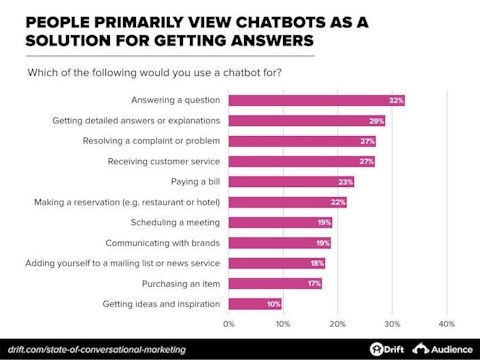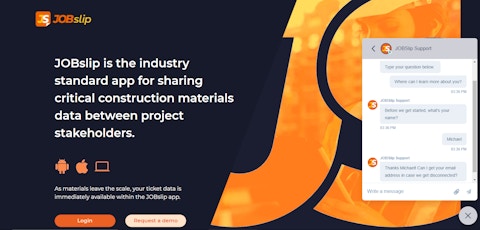Keeping up with technology and marketing trends is essential as a building materials distributor. It helps you acquire more customers, generate leads and stand out from competitors. However, the building materials industry has been slow to adopt new technology even if it can help them reach their business goals.
One of the leading technologies that can grow sales and qualify leads is a chatbot. (And as an added bonus, it's pretty quick to get setup and launched on your site too.) Chatbots offer an intuitive, personalized experience that is both convenient for customers and profitable for businesses. In fact, 58% of B2B businesses already use chatbots on their website.
Chatbots are becoming popular across different industries because of their return on investment. With their technology, building material companies don’t need to rely on large customer service teams or 24/hour availability. They can spend less money and time managing each individual inquiry. In fact, 32% of customers would use chatbots to receive an answer to a question.

Distributors can use chatbots to help customers find the right product, get quotes or connect with the right person to get the answers they need. It also creates a clear competitive advantage as few distributors have adopted chatbots as a marketing tool. All of which improves the customer experience and drives more revenue.
Choose the Right Chatbot Solution
The first step is to decide what chatbot solution will work best for your company. There are two main categories of chatbots: artificial intelligence (AI) chatbots and basic chatbots.
AI-powered bots use technology like artificial intelligence (AI) and machine learning (ML), meaning they can learn from their interactions with users over time in order to provide the most accurate responses possible. This provides customers with better, personalized experiences and product recommendations. However, AI chatbots can be more expensive and difficult to set up.
The chatbot on this website uses artificial intelligence to accurately map responses and learn more about the customer.

Simple chatbots on the other hand, have pre-configured questions and answers. These include frequently asked questions or options for speaking with a live agent. They are less expensive and easier to set up but won't drive as many conversions as advanced chatbots.
For example, the chatbot on this building materials website directly connects you with a live agent.

When you ask questions, it provides automatic responses and the live agent can take over the chat to provide more detailed information.
Adjust Chatbots for Each Page
Where should you use a chatbot on your website? First, you must consider that each customer's wants and needs are different. Providing the same experience across a website with your chatbot will decrease engagement and conversions. Building materials distributors need to adjust chatbot scripts for different pages on their site.
For instance, what a building professional expects from a homepage is different than if they visit product pages or an about page. On the homepage, a chatbot should be high-level and help users:
- Find the right product and category pages.
- Learn more about your company.
- Consume content you publish like a blog or newsletter.
- Connect with a live customer service agent.
You can also allow the user to ask a particular question before connecting them with a customer service rep to get exactly what they need.

On product pages, chatbots can be more specific. Provide prompts related to product information, categories and promotions you have available. Help customers find the product that's right for their project and budget.
Create FAQs
Frequently asked questions are a great strategy for chatbots. Instead of having to respond to emails or phone calls, a chatbot can answer questions to help move building pros throughout your website or eCommerce store. Chatbots can help businesses save up to 30% on their customer support costs for this reason.
Building materials distributors should mine data from their CRM, email tools, marketing software, analytics, surveys and sales calls to determine what FAQs to use. Each page of a website can have a different set of frequently asked questions as well. For example, you can answer product-specific questions with a chatbot on product pages or company-focused questions on your about page.
Speak in Your Customer's Language
The best chatbots not only answer a building pro's question but make them feel comfortable. This requires you to speak in their language. This will help them resonate with the chatbot's messaging and be more likely to take action. Use the words and phrases customers use when they communicate with your brand. Sales calls, emails and social media conversations are some of the best sources for this information.
If your company chooses a chatbot with artificial intelligence, many solutions will optimize scripts based on each user's interactions. Templates will be adjusted with words and phrases that customers use in real-time. With basic chatbots, building materials distributors will have to manually adjust scripts.
Measure Your Chatbot
55% of businesses using chatbots generate a greater volume of high-quality leads. But, you must properly measure a chatbot's performance to help you to determine its return on investment and where it can be improved. The easiest way to measure your chatbot’s success is by setting key performance indicators and monitoring them on a regular basis.
These include:
- How many people who came in through a bot conversation made a purchase or requested more information.
- How many conversations were started and closed without any action taken.
- How many people connected with a live agent through the chatbot.
- The average length of each conversation.
Chatbot software will include in-depth analytics on these metrics and others for your company to investigate. If KPIs are underperforming, consider testing new scripts, calls to action and where the chatbot is located on your website.
Building materials is an industry that has been late to adopt digital marketing trends and technology. However, using the latest technology helps you stand out from the competition, drive more conversions and provide a better customer experience.
Chatbots are an effective channel that building materials distributors can use to drive more sales and revenue. The first step is choosing the right solution. Basic chatbots will answer FAQs and provide helpful responses as a customer support tool. Advanced chatbots that use artificial intelligence improve over time as they collect data and optimize in real-time although the cost is higher most upfront.
Building materials distributors need to optimize chatbot templates for different areas of their website. Answer frequently asked questions and provide them with links to the most relevant pages. End each prompt with a strong call to action and use a language your customers can resonate with.
Learn how Venveo can help turn an effective online presence into your best salesperson.








